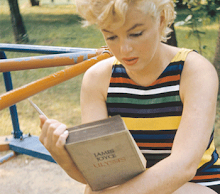Lost Girls: Wendy Darling II

In Lost Girls, Neverland is replaced by the spinney in the park; a place for Wendy to begin her own sexual discoveries. Again, Gebbie and Moore suggest that Wendy’s stories are just fantasies, or at the very least, operate with different rules to normal, non-spinney interaction: “…it felt like a dream, as if the real world were a different country altogether. All the rules were different in the spinney.” This is echoed later in Lost Girls, when Alice describes the hotel in which she, Dorothy and Wendy are staying in as “our island, like your spinney”; a place where each of the women is able to confess and explore their sexual fantasies and experiences without fear of reproach or rejection.
In the spinney, Peter introduces the Darling children to his friends, a ramshackle bunch of boys (the lost boys), and his lithe, gorgeous sister, Annabel (Tinker Bell). Spied on by a vicious, yet publicly respected, paedophile, a man associated with Wendy’s father (Captain Hook), Wendy’s teenage sexual experimentation enables her to indulge her fantasies of becoming like Tinker Bell, who is worshipped and degraded by the boys.
However, as happens throughout Lost Girls, the line between reality and fantasy is constantly challenged and blurred. Thus, as Wendy’s sexual games with the lost boys and Tinker Bell become increasingly elaborate, they collide more forcefully, and more farcically, with Barrie’s Peter Pan. For example, Wendy’s mature female body shocks the lost boys into silence, buoying her up with sexual bravado as she undresses for them before playing their ‘mother’;
I went to each of them in turn, to tuck then in and give a goodnight kiss. The first one was a boy called Tuttle, that they nicknamed ‘Tootles’. When we kissed, my nipples brushed across his hard, bare chest. I put my hand in his trousers, and he called me Mother.
In Barrie’s Peter Pan, Wendy stands in direct opposition to the boys in the story. As a girl approaching adulthood, she stands on the cusp of those permitted access into Neverland. Paradoxically, despite her love of fairytale and her reluctance to grow up, it is only after Wendy travels to Neverland and is dumped into a pit full of little lost boys, that her mature, maternal side is triggered. The boys flock around this sudden injection of female comfort and kindness, begging her to become their mother and Wendy quite literally becomes their “old girl”. She goes from child to mummy in the time it takes her to fly out the window.
Tinker Bell is, of course, Wendy’s nemesis. She is girlhood epitomised, so tiny and full of tantrums, all sparkle, vulnerability and female cunning. Totally overwhelmed by her feelings for Peter, Tinker Bell deeply resents Peter’s affection for Wendy and will stop at nothing to beat her love rival. No female solidarity here. Furthermore, in Peter Pan her wild mood swings and extreme behaviour are excused due to the fact that she is a mere fairy, and so her small stature prevents her from containing more than one feeling at the same time. In other words, she is a child.
She is also the archetypal bad girl. After all, she can make people fly... Heck, she’s such an archetypal male fantasy even her Disney version is a blonde, sexy Marilyn-eqsue hottie. However, when Peter returns to the Darling house in Barrie’s book, (and he keeps on returning, taking first Wendy, and then her daughter and granddaughter in later books) it is revealed that Tinker Bell ‘is no more’ since ‘fairies don't live long, but they are so small that a short time seems a good while to them’. You can’t marry girls like that.
In Lost Girls, in contrast to the nubile, girlish Tinker Bell, Wendy’s body is full, womanly and maternal. When Peter approaches her as whore, not mother, Wendy feels these two competing sides clash, saying of Peter’s first kiss; ‘it wasn’t an ordinary kiss; the way you’d kiss your husband’. As we see, the adult Wendy’s sexually unfulfilling relationship with her husband is the product of her (and his) inability to reconcile the two.


1 Comments:
This is great!
Post a Comment
Subscribe to Post Comments [Atom]
<< Home